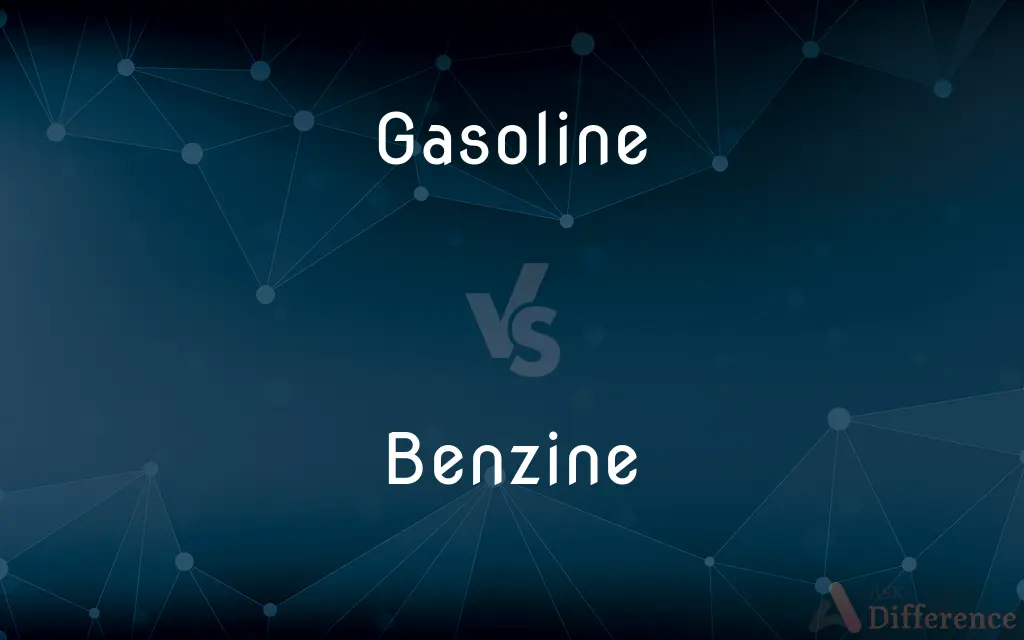Gasoline vs. Benzine — What's the Difference?
By Urooj Arif & Fiza Rafique — Updated on April 3, 2024
Gasoline is a refined petroleum product used primarily as fuel in internal combustion engines, while benzine is a hydrocarbon mixture used as a solvent and in making various chemicals.

Difference Between Gasoline and Benzine
Table of Contents
ADVERTISEMENT
Key Differences
Gasoline, a complex blend of hydrocarbons, is engineered to ignite and burn within internal combustion engines, powering vehicles and machinery. Whereas, benzine, often confused with benzene, refers to a less specific mixture of hydrocarbons used for its solvent properties and in chemical synthesis.
Gasoline’s composition varies to meet seasonal weather requirements and environmental regulations, which dictate its volatility and octane rating. On the other hand, benzine's composition is tailored more by its need for solvency power and less by such external factors, focusing on its effectiveness in dissolving oils, fats, and various polymers.
Environmental concerns have led to the reformulation of gasoline to reduce emissions of harmful pollutants. Benzine, while also subject to regulatory scrutiny, is primarily assessed for its safety and efficacy as an industrial solvent, rather than its environmental impact when burned as fuel.
Gasoline is readily available to consumers for their vehicles, with its quality directly impacting engine performance and longevity. In contrast, benzine is typically used in industrial and laboratory settings, where its high volatility and solvency are required for specific processes.
While gasoline is crucial for transportation and power generation, benzine plays a vital role in manufacturing, cleaning, and as a precursor in synthesizing other chemicals, highlighting the distinct applications of these two hydrocarbon mixtures.
ADVERTISEMENT
Comparison Chart
Primary Use
Fuel for internal combustion engines
Solvent and in chemical manufacturing
Composition
Blend of refined hydrocarbons
Mixture of hydrocarbons with high solvency
Availability
Widely available for consumers
Primarily used in industrial settings
Environmental Impact
Regulated for emissions
Concerns focus on safety and solvent efficacy
Role in Industry
Powers vehicles and machinery
Used in manufacturing, cleaning, and synthesis
Compare with Definitions
Gasoline
Seasonally adjusted blends.
Winter gasoline helps reduce starting problems in cold weather.
Benzine
Known for its volatility.
Benzine evaporates quickly, making it ideal for certain industrial applications.
Gasoline
A fuel for vehicles and engines.
The car's efficiency depends on the type of gasoline used.
Benzine
Component in chemical synthesis.
Benzine acts as a starting material for making various chemicals.
Gasoline
Subject to environmental regulations.
Gasoline now contains less sulfur to minimize pollution.
Benzine
Not commonly used as fuel.
Despite its name, benzine is not suitable for fueling most engines.
Gasoline
Varies by octane rating.
High-performance engines require high-octane gasoline.
Benzine
A solvent for fats, waxes, and resins.
Benzine is used to remove grease from mechanical parts.
Gasoline
Contains additives to improve performance.
Modern gasoline includes detergents to keep engines clean.
Benzine
Used in manufacturing processes.
Benzine is essential in the rubber industry for its solvent properties.
Gasoline
Gasoline () or petrol () (see the etymology for naming differences and the use of the term gas) is a transparent, petroleum-derived flammable liquid that is used primarily as a fuel in most spark-ignited internal combustion engines. It consists mostly of organic compounds obtained by the fractional distillation of petroleum, enhanced with a variety of additives.
Benzine
See naphtha.
Gasoline
A volatile mixture of flammable liquid hydrocarbons derived chiefly from crude petroleum and used principally as a fuel for internal-combustion engines.
Benzine
Benzene
Gasoline
A flammable liquid consisting of a mixture of refined petroleum hydrocarbons, mainly used as a motor fuel; petrol.
Benzine
Any flammable petroleum distillate used as a solvent or fuel
Gasoline
(countable) Any specific kind of gasoline.
The refinery produces a wide range of gasolines.
Benzine
A liquid consisting mainly of the lighter and more volatile hydrocarbons of petroleum or kerosene oil, used as a solvent and for cleansing soiled fabrics; - called also petroleum spirit, petroleum benzine. Varieties or similar products are gasoline, naphtha, rhigolene, ligroin, etc.
Gasoline
Marijuana, especially very potent or high quality.
Benzine
Same as Benzene.
Gasoline
(slang) An alcoholic beverage made of vodka and energy drink.
Benzine
A colorless liquid hydrocarbon; highly inflammable; carcinogenic; the simplest of the aromatic compounds
Gasoline
Made from or using gasoline.
Gasoline
A highly volatile mixture of fluid hydrocarbons, obtained mostly from petroleum, as also by the distillation of bituminous coal. It is used as a fuel for most automobiles and for many other vehicles with internal combustion engines. The gasoline of commerce is typically blended with additives to improve its performance in internal combustion engines. Gasoline was also used in the early 1900's in making air gas, and in giving illuminating power to water gas. See Carburetor.
Gasoline
A volatile flammable mixture of hydrocarbons (hexane and heptane and octane etc.) derived from petroleum; used mainly as a fuel in internal-combustion engines
Common Curiosities
Can benzine be used as fuel like gasoline?
No, benzine is not suitable for use as engine fuel due to its different properties and applications.
What distinguishes benzine from gasoline?
Benzine is used mainly as a solvent and in chemical manufacturing, not as fuel.
What are the environmental concerns with gasoline?
The emissions from burning gasoline can contribute to air pollution and climate change.
What is gasoline primarily used for?
Gasoline is used as fuel in internal combustion engines.
Why is benzine not widely available to consumers?
Due to its specialized industrial use and safety concerns, it's not sold for general consumer use.
What is an octane rating?
A measure of a fuel's ability to resist knocking or pinging during combustion.
How are gasoline and benzine similar?
Both are hydrocarbon mixtures derived from petroleum.
Why is gasoline composition variable?
It varies to meet environmental regulations and seasonal requirements for performance.
Is benzine dangerous to use?
Yes, due to its high volatility and flammability, benzine must be handled with care.
How is benzine's effectiveness determined?
By its ability to dissolve or clean specific substances, such as oils, fats, and polymers.
What role does benzine play in industry?
It's used as a solvent in manufacturing and cleaning, and as a precursor in chemical synthesis.
What are the primary applications of benzine in manufacturing?
Benzine is used in cleaning, degreasing, and as a solvent in the production of chemicals and materials.
How has gasoline been modified for environmental reasons?
Its formulation has been changed to reduce harmful emissions, such as lowering sulfur content.
Are there safety concerns with handling gasoline?
Yes, gasoline is flammable and must be stored and handled with care to prevent fires and exposure.
Can gasoline quality affect vehicle performance?
Yes, the quality and octane rating of gasoline can significantly impact engine performance and efficiency.
Share Your Discovery

Previous Comparison
Principal vs. Headmistress
Next Comparison
Logical vs. IntuitiveAuthor Spotlight
Written by
Urooj ArifUrooj is a skilled content writer at Ask Difference, known for her exceptional ability to simplify complex topics into engaging and informative content. With a passion for research and a flair for clear, concise writing, she consistently delivers articles that resonate with our diverse audience.
Co-written by
Fiza RafiqueFiza Rafique is a skilled content writer at AskDifference.com, where she meticulously refines and enhances written pieces. Drawing from her vast editorial expertise, Fiza ensures clarity, accuracy, and precision in every article. Passionate about language, she continually seeks to elevate the quality of content for readers worldwide.















































